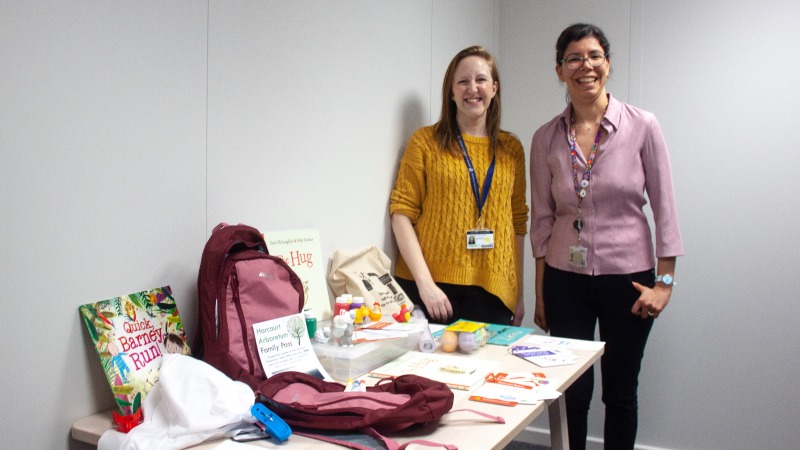New free packs developed by early-years experts help parents support infants’ development

Hundreds of new resource packs developed by a team including researchers from Oxford Brookes University and the University of Oxford are being distributed to families with babies and toddlers.
Already hundreds of the new The Little Explorer packs have been distributed through community centres and organisations that work with young families in Oxfordshire. Making simple dens, nature scavenger hunts, art and much more are among the ideas in the latest pack.
It is the third in a series of resource packs that aim to help parents spend quality time doing enriching activities with children aged up to three. It follows the publication of The Colourful Chalk Talk and Walk Pack and The Not Too Messy Animal Pack earlier last year.
It is hoped the resources will be rolled out nationally following the success of the scheme in Oxfordshire.
The packs were developed following a research project into the impact of the pandemic and lockdowns on the cognitive development of babies and toddlers. Dr Nayeli Gonzalez-Gomez, Senior Lecturer in Psychology at Oxford Brookes, joined experts from five UK universities, including Dr Alex Hendry of the University of Oxford, for the research.
Researchers found that enriching activities for children, for example showing them new things, engaging in art and crafts and reading them stories, helped them develop their cognitive skills. Spending more time looking at screens is linked to poorer thinking and regulation of emotional skills for children.
Dr Gonzalez-Gomez said: “We did some workshops with parents and practitioners on the barriers that parents face to engage in enriching activities. We know that sometimes it’s hard for parents and it was especially tough during the lockdowns.
“We came up with ideas for activities that are easy to do at home, that don't take too much time or are too messy. The packs give parents the resources to help them spend quality time with their children.
“My hope is we can develop a more sustainable way of producing and distributing the packs so they can be rolled out nationally.”
Dr Gonzalez-Gomez and the team of experts joined forces with three charities, the National Literacy Trust, Peeple, and Home-Start Oxford to produce the resources. The first two packs were sent out early in 2022.
Dr Hendry said: “We’re so grateful that ESRC (the University of Oxford’s Economic and Social Research Council) has supported this project as it has enabled us to share our research findings about the value of parent-child play directly with parents in a way that is meaningful to them.
“Parents play such an important role in supporting children’s early development. Hopefully, these packs help parents feel valued for the amazing things they are already doing and give them some practical support to do even more.
“In the workshops in the first phase of this project, parents told us that some of the barriers to engaging in a range of activities with their children are to do with having ideas, time and space. We came up with these packs to help address these barriers, and to show that even simple, quick activities can be really valuable in supporting children’s development.”
Each activity pack contains a book, craft materials and suggestions for ways to use them. The materials are also available on the Babylab website.
